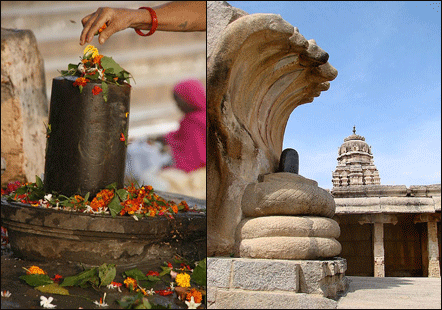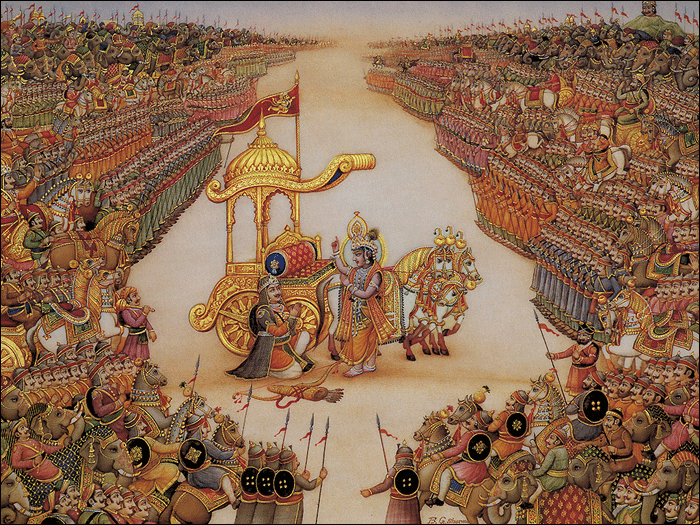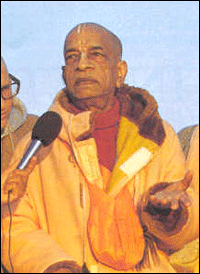
Evidence that we have lived before.
Hinduism -- the Source of Knowledge When most of us think of religion, we usually are thinking of a revelation of God that has been handed down by a special person, like Buddha, Jesus or Mohammed, and which has an associated scripture that details the teachings of the prophet or enlightened personality. Hinduism does have its so-called "holy books" but the revelations about God and the soul seem to have come from the depths of the human psyche, over countless generations of meditation and introspection. Much of this happened before the ancient writing, Sanskrit, was developed and so it must have been communicated orally. Hinduism is the oldest religious belief system that we know about, with a history that goes back thousands of years. Although it is full of symbols and strange icons, it is deeply intellectual and contains some of the highest concepts regarding ontology, the origin and destiny of everything. Many of these revelations can only be described as paradoxical. One example is the linga, a cylindrical shaped object, usually made from stone, that is the focus of reverence and worship. Hindus will adorn this strange object with flowers, honey and milk. Great shrines are built around this object [below]. Non-Hindus cannot understand why anyone would worship a stone cylinder, yet the idea behind this object shows the deep understanding that Hindus have for God, the Creator.
 Hindu Puranas (ancient texts) state that the Shiva-Linga is the source of the universe, the Supreme Being, in whom the universe originates and into whom it finally merges. Since this being existed prior to its creation, it is beyond time, matter or form. It cannot be known or described to creatures of time. We have no mental concept of such things. Therefore to depict this attribute of God as a human-like statue would be an error. Yet, humans do need some object to focus their reverence to this aspect of Deity and so the linga serves as this abstract idea. A basic, bland shape which represents the source of everything -- it is simply brilliant!
Hindus were the first religious system to express the idea of reincarnation. Almost every other faith copied or borrowed from their revelations. Here again, we find more truths expressed as a paradox:
Three little words...
According to Hinduism, you and I are the amalgamation of ksetrai-jña, the consciousness that identifies with the material body; jiva, our eternal and individualized soul; and Paramatma, the Super-soul of the Creator.
In our mortal life, as human beings, we identify with our body. But after we die we once again revert to our true identity which is our soul. It is this individualized soul that is invested in another body when we are reincarnated. Our soul is sustained and made possible by the soul of God the Creator.
In Hindu tradition there are short stories, like parables, that illustrate these concepts. The Upanishads tell of a tree with two birds sitting in its branches.
On the same tree man sits grieving, immersed, bewildered, by his own impotence. But when he sees the other lord contented and knows his glory, then his grief passes away.
One bird is busy feeding on the fruit in the lower branches while the other just sits atop of the tree and observes. Both are souls, equal in nature, but the one eating the fruit is preoccupied and does not enjoy the calm ecstasy of the tree. It's too busy to even notice the other bird. This is the so-called "conditioned soul" of man who, because of his material attachments, cannot appreciate the calm and must continually busy himself with the three binding conditions (yes, three more words): goodness, ignorance and passion. Only when the busy bird sees the calm one does he realize that its pursuit of fruit is not necessary. Only then are both birds the same.
Like Tibetan Buddhism, Hinduism stresses the need to detach from the senses and material pursuits. The goal of both religious systems is to identify with the soul -- the observer of life -- and thereby escape the desire for more reincarnations upon death (moksha). But Hinduism has a distinct difference. When the desire for a new life is extinguished in Hinduism, the individual soul does not become absorbed by the Super-soul (as in Buddhism) and remains a unique entity, capable of associating and basking in the glory of the Super-soul.
Another difference is that Hinduism detaches even from good works. The paradox of killing another human -- or even neglecting one's compassion for friends and family -- to achieve a higher level of consciousness is hard for most non-Hindus to comprehend. This apparent contradiction was addressed head on in the Bhagavad-gita.
The Bhagavad-gita and KRSNA Conciousness
One of the oldest religious books in Hinduism is the Mahabharata, whose origins go back 5000 years. The best known part of this long epic is called the Bhagavad-gita, and it is here that we get the foundation of Hindu reincarnation.
The text is mainly a dialog between Arjuna and Krishna. Arjuna is a leader whose army is trying to avenge his followers over a long and complicated family conflict with another ruler and his army. Krishna is a leader from another land who has come to help both sides settle their conflict. We're told that Krishna came to the battle field with a formidable army of his own.
Before the opposing armies face off against each other, Krishna has offered his army to fight for one side and his services as an advisor to the other. He lets each sides decide what they want. Arjuna, recognizing that Krishna is very special, chooses to have Him as his advisor and charioteer.
In dramatic epic style, Arjuna inspects the troops before the battle. He notices that many good and well respected people are in both armies -- also members of his family. He realizes that the impending battle will kill many of these people and he contemplates the loss in his conversation with Krishna.
When the son of Kunti, Arjuna, saw all these different grades of friends and relatives, he became overwhelmed with compassion and spoke thus:
'My dear Krishna, seeing my friends and relatives present before me in such fighting spirit, I feel the limbs of my body quivering and my mouth drying up.'
'I do not see how any good can come from killing my own kinsmen in this battle, nor can I, my dear Krishna, desire any subsequent victory, kingdom, or happiness.'
Having spoken thus, Arjuna, chastiser of enemies, told Krishna, 'Govinda, I shall not fight,' and fell silent.
This sounds like a plea for sanity and pacifism. Arjuna sees the futility in war and killing and understands the misery that this will cause. He decides to concede the battle but asks Krishna to tell him what to do. Surprisingly, Krishna's advice is to perform his duty and continue to fight.
Krishna then delivers his teaching on reincarnation, revealing his true identity as the Supreme Personality of the Godhead and telling Arjuna that a human life has little significance compared to the human soul. He reminds Arjuna that death will only liberate the dead from their current mortal existence -- and they will be reborn again. Their true identity -- the jiva, individualized soul, will not die.
'For the soul there is neither birth nor death at any time. He has not come into being, does not come into being, and will not come into being. He is unborn, eternal, ever-existing and primeval. He is not slain when the body is slain.'
All created beings are unmanifest in their beginning, manifest in their interim state, and unmanifest again when annihilated. So what need is there for lamentation?'
The Bhagvad-gita continues with an in-depth lesson on the psychology of man, attempting to explain how each person can improve their reincarnations and ultimately escape the desire to be born again.
Contrary to the Tibetan Buddhists, who promote compassion for every living thing, Hindus warn against this, as it causes continued attachment to the material world. In fact, the three conditions of mind that bind the soul to reincarnation include goodness as an important one, along with passion and ignorance. Wanting to be good for the purpose of benefiting from the good acts is but another attachement to the cause-effect phenomenon of mortal existence.
So now the paradox becomes clear: The person who begins the journey to enlightenment is not the one who reaches the goal. We could also say, To gain everything you must give it all up. Hinduism is full of these conundrums because the goal of enlightenment is to not have a goal, but this psychological condition can only be evolved -- not achieved.
The Guru as Teacher
Rather than risk becoming materially or emotionally attached to a Guru, Swami Prabhupada has discovered that the Super-soul, in the personality of Lord Krishna, can become one's personal Guru. He calls this method Krishna Consciousness and prescribes chanting the name of Krishna as a means of purifying the mind and inviting the necessary psychological and spiritual changes to happen. Rather than denying the fruits of our acts, both good and bad, Krishna Consciousness conceives everything as a devotional act, offered to the Lord. It's simple and direct, and apparently effective.
Followers of the Krishna Consciousness system claim that they are mysteriously shown opportunities to gain insight through their everyday life. Their teacher is inside. They say that the mind seems receptive to these subtle changes once they're focused on devotion to God and the elimination of personal motives. As they becomes focused on enlightenment, reinforced by chanting the name of God, they experience contentment and are less distracted by greed, lust or emotions. As such, they are then less likely to harm others, either by thought or deed. The goodness of their personality shines through naturally and doesn't require compassion, empathy or sympathy.
At the moment of death...
All of these changes to our psyche are meant to condition our mind so that, at the moment of our death, we can resist the desire to experience material or sensual experience again. The example is given of an archer. The destination of his arrow is determined by his accumulated skill at the exact moment when he releases the bow. It is an instantaneous moment, yet is comes from long and arduous learning and experience. Our reincarnation destiny is also decided in an instant, but that instant is conditioned by how we lived our life.
We cannot conclude the consideration of Hindu reincarnation without mentioning karma. Although Hinduism originated the concept of evolving and devolving reincarnations, it has not been entirely understood by many. What constitutes a good act, worthy of good karma? How can we judge what is good or bad?
The Hindu belief in detachment from the fruits of action seems to make the idea of accumulating good or bad "points" a moot point. Acts that are done with no anticipation for their consequence cannot be judged this way. Further, acts which are done because they will reap good karma only lead to attachment and are contrary to the goal of non-materialism. This is a major misunderstanding that many people continue to have.
The term karma actually refers to the need of the conditioned individual soul to have a material body of some type. That type is determined by the condition of the mind. The jiva is fully able to create a body to the mind's requirements, depending on its attachment to the senses and involvement in the cause-effect phenomenon of life. In Hindu belief this can result in a reincarnation as a human with greater or lesser endowments -- or it can be an animal who best meets these requirements. There is no punishment with karma. Reincarnation is simply the result of our own desires manifest by our enternal, individual soul.
If our mind is conditioned to seek spiritual union with God, we will become free from rebirth and remain a conscious spirit with Him.
Comments:
Hinduism was founded by Seven Sages, called SaptaRishis -- The first ever look at the Origins of the World's Third Largest Religion
Who founded Hinduism, the world's third largest religion with 800 million followers, is a question that puzzles not just scholars, but Hindus themselves. Buddhism is based on Buddha's teachings, while Christianity is based on those of Jesus. Islam was founded by the prophet, while Judaism is largely based on efforts of Abraham and Moses. Zoroastrianism was promulgated by Zoroaster. However, the founders of Hinduism have been lost in the dungeons of time, becoming the cause of intense debate and mystery to this day. When confronted with this question, answers range as follows:
"Relatively little is known about the origins of Hinduism, as it predates recorded history."
"Hinduism -- as I see it -- is a coming together of various doctrines and philosophies. To find out the exact origins of Hinduism is a bit pointless I think. It is like asking -- Where did the Ocean Originate"
"Hinduism, the world's oldest religion, has no beginning -- it precedes recorded history. It has no human founder. It is a mystical religion."
These answers, great as they may seem, show something wanting. Rather than getting lost in these so called well-established historical theories of India such as Aryan Invasion theory, Out of India theory, and what not; and just scan the Hindu scriptures with a fresh and open mind, I think the answer is somewhat straightforward. A lot of Hindu scriptures talk about a group of seven elite people called SaptaRishis, meaning seven sages -- they are mentioned as the Patriarchs of Indian religion. And that is where our answer lies.
Hinduism was founded by an institution of Seven Sages called Saptarishis. Just as we have Pope for Christianity today, Hinduism, from the beginning, had an institution of seven sages who were the patriarchs of the Vedic religion. They very strictly guarded the Hindu Vedic body of knowledge, and the copy of the Vedas (primary scriptures of Hindus) available to them was considered to be the final copy. They were considered as God's manifestation on earth, and their word was the final authority in religious matters.
Any changes to the Vedas were needed to be approved by this elite group of sages. If the reasons were justified, they approved the changes and incorporated them into the Vedas. Otherwise, they rejected it and kept the Vedas intact without any contamination. From what appears, they were extremely strict about changes to the Vedas. Even to this day of Hinduism, a word in Veda is normally considered as the final authority to the literal T. And this faith in Vedas was built upon a tradition where the Vedas were very strictly and jealously guarded from any changes whatsoever, unless the change really justified it. Some super human justification was required to have them changed. Any changes, to the extent possible, were always added as appendages rather than their being incorporated into the Vedas. So we have Brahmanas, Aranyakas, and Upanishads as appendages to the Vedas. As more and more philosophy developed, all of them got incorporated into this body as appendages.
It is this institution of seven sages that expended large amount of effort over thousands of years in unifying a large number of traditions from across continents and civilizations into one universal religion of Hinduism that we see today. The Hindu trinity, the Hindu divine hierarchy, the Hindu festivals, and everything else that we see today was formulated by them. It is they who declared the historical persons Ram and Krishna to be the incarnations of God. It is they who inserted the important hymns of Purusha Sukta, Narayana Sukta, and Sri Sukta into the Vedas --these all important hymns were once not part of Vedas.
The names of the SaptaRishis carried over from one generation to the next. For example, if Kasyap dies, his son would take on the name of Kasyap and get inducted into the SaptaRishis. Once in a while, for some reason, like one of the seven rishis dying without having any children, the names of one or more of the rishis changed, giving us a different set of SaptaRishis.
The religion got so excessively dependent on these sages that they started being considered as the representatives of the creator on earth. This slowly led to their deification and they started being mythicized. They were declared as the mind born sons of God. Subsequently, they were equated with the most evolved light beings in the creation and the guardians of divine laws. Further deification of their attributes lead to the addition of more and more myths and halo around them. This sort of excessive mythicization finally lead to the relegation of this institution from the purview of the real world into the realm of mythology, to the extent that they started being regarded as mythical personalities.
This institution got destroyed at the time of the three hundred year severe drought of 2200 BC. At that time, most of the Indians, devastated by the drought, left India for foreign shores, especially to European lands. Because of the severe suffering that people underwent because of the drought, people lost faith in a useless God who did not answer their prayers, leading to the rise of atheistic cults on the subcontinent. The institution of seven sages got destroyed in this religious upheaval and societal turbulence, as a result of which, the origins of Hinduism have once and for all become lost in the dungeons of time, becoming the source of intense mystery to this day.
Source: Excerpts from Prithviraj's book "19000 Years of World History: The Story of Religion," available on all online stores. |


 Many Hindus believe that the path to detachment is too difficult to attempt without a teacher, or Guru. The disregard of our senses, instincts and desires is contrary to our mortal survival and continuation. The practices required make no sense to the rational mind. Only by accepting a teacher and obeying the prescribed rituals can we succeed in changing our consciousness. But others -- like Swami Prabhupada, the world's most distinguished Vedic scholar -- have a shortcut.
Many Hindus believe that the path to detachment is too difficult to attempt without a teacher, or Guru. The disregard of our senses, instincts and desires is contrary to our mortal survival and continuation. The practices required make no sense to the rational mind. Only by accepting a teacher and obeying the prescribed rituals can we succeed in changing our consciousness. But others -- like Swami Prabhupada, the world's most distinguished Vedic scholar -- have a shortcut.
